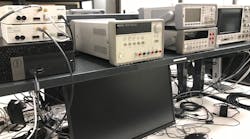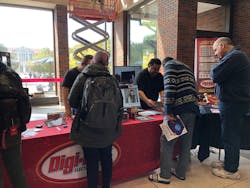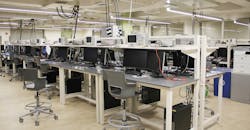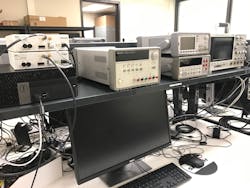On October 25th, Electronic Design hosted an event at Purdue University in West Lafayette, Ind. (Fig. 1). The event gave electrical engineering students an opportunity to meet with staff from Electronic Design as well as Digi-Key and Renesas Electronics. Students were able to see technology demos, discuss industry opportunities, and enjoy lunch and snacks, too. The event also featured a live raffle.
1. At the event, Purdue students had the opportunity to check out some demos from Digi-Key.
During our time at Purdue, we had the chance to meet with Mark Johnson, who is the director of instructional laboratories for the university’s School of Electrical and Computer Engineering (ECE). Johnson currently supervises several courses, such as ASIC Design Lab, Computer Architecture Prototyping Lab, and Software Engineering Tools Lab.
Johnson also co-advises student projects, including Senior Design and System-on-Chip Design. On top of that, he supports and maintains many of the electronic-design-automation (EDA) tools used by the School of ECE, as well as being involved in the development and modernization of laboratories for the VLSI and computer engineering areas within the school.
For Johnson, what’s the most rewarding part of being the director of instructional laboratories for the school of ECE? He answered, “There is more than one thing, but I’ll keep the list short. The most rewarding thing for me happens when I am able to work directly with students to enable and equip them to accomplish something that they want to do. Equally satisfying is when alumni tell me how they are using things that they learned in my labs. Finally, as lab director, I am able to get lab staff and student employees involved in doing the same thing for other students.”
Johnson gave us a tour during our visit, which allowed us to see some of Purdue’s numerous engineering labs. It was quite impressive to see just how many labs the university has and the significant amount of test equipment to go with it. It’s clear that Purdue is focused on giving students a hands-on experience by allowing them to use modern test equipment, such as Keysight Technologies’ InfiniiVision mixed-signal oscilloscopes (Fig. 2). Furthermore, Purdue has benefitted from funding and/or equipment donations from companies like National Instruments, Analog Devices, and Texas Instruments, among others.
2. Purdue’s engineering labs give students a chance to work with modern equipment.
One specific lab can be seen in Figure 3. This lab is used for the Transmission of Information course (ECE 44000), which focuses on communication systems and introduces students to advanced engineering workstations for the purpose of designing and testing communication systems. As seen in Figure 3, the lab includes equipment like the USRP N210 products from Ettus Research (a National Instruments brand).
3. In this lab, students are using USRP N210 products from Ettus Research (a National Instruments brand).
What does Johnson hope that engineering students will ultimately gain from their hands-on lab experience? He says, “There are a lot of things I hope that students get from this experience, but I want all of them to come away with a strong sense of being able to put the theory and techniques they are learning to practical use. Students sometimes see their courses and even lab work as merely a test of their intelligence and endurance. It excites me when students recognize that what they are learning is giving them power to do far more than they could have imagined.”




